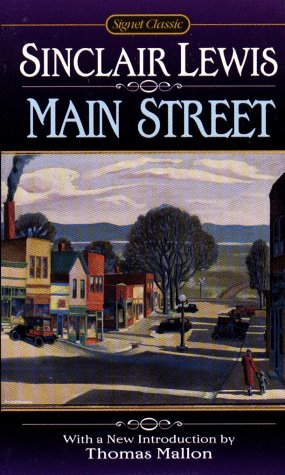I am Carol Kennicott.
For those that have yet to read Main Street by Sinclair Lewis, the book is centered around the overly sarcastic (and hilarious) protagonist Carol Milford. Milford is a liberal, free spirited girl who grew up in St. Paul, Minnesota, attended college in the Twin Cities, and starts the book enjoying a busy, urban life complete with intelligent friends and all the right parties until she meets Dr. Kennicott.
The Doctor sweeps her off her feet and to the small, prairie backwoods town of Gopher Prairie, Minnesota that consists of not much more than a Main Street and a few back streets. She detests the small town life and all of its inhabitants, and dreams of nothing more than leaving immediately. As the book progresses, she attempts to become a part of the town, joining clubs and societies, attending church, and making the best of her husband’s gossipy, boring friends.
Spoiler Alert. Years of trying to fit in and not feeling at all like she can be her liberal, outspoken self lead her move to Washington DC for a few years to pursue a career and her happiness – while still maintaining her marriage with Kennicott. She eventually returns, with a somewhat new outlook on life. But we see from the last few sentences of the book, the monotony of Carol’s life in Gopher Prairie will be unending.
———————————————————–
I grew up in a tiny town in Minnesota on Main Street. My address was literally Main Street AND Minnesota. My father was the mayor and a small business owner, we had a lovely home and different outlook on life than most of our neighbors. My parents encouraged my sisters and myself to be free spirited, to think for ourselves, and to follow our dreams.
I attended college in the Twin Cities (I’m telling you – this book was written for ME), and fell deeply in love with big cities. I loved the bustling streets always filled with something to do and someone to do it with. I loved the skylines, the parties, the venues, the restaurants, the shopping, the everything. I was head over heels for Minneapolis.
But I was also falling madly in love with my now husband. A military man, who I married after finishing college, and then joined in the isolated, small town of Fairbanks, Alaska. Carol’s struggle throughout “Main Street” is my current struggle.
Kennicott’s intelligent, open minded, kind demeanor while still being passionate about nature, the outdoors, and small town values reminds me of my parents and my husband.
The townspeople in the book remind me of the groups of people I have met throughout Fairbanks and really don’t have much in common with, at all. Vida and Fern, the two friends Carol made for brief periods of time are without a doubt the ONE army spouse I had ridiculous amounts of things in common with and spent nine months hanging out with before she moved.
The comparisons go on.
I devoured the book, eager to find an answer to Carol’s/my struggle and I came to the ending with an unsettling feeling that there wasn’t one. There would never be an end to Carol’s struggle as long as she envied the big cities and Kennicott was not willing to move. As hard as she fought to change how she felt about it, time could only change so much about a person. We are who we are.
Thankfully, my time in this small, isolated town is on a timeline. Otherwise a government job in Washington DC may have been my next stop. That or crazy town.
A liberal, free spirited, city girl can only survive isolation from civilization for so long.
“They were staggered to learn that a real tangible person, living in Minnesota, and married to their own flesh-and-blood relation, could apparently believe that divorce may not always be immoral; that illegitimate children do not bear any special and guaranteed form of curse; that there are ethical authorities outside of the Hebrew Bible; that men have drunk wine yet not died in the gutter; that the capitalistic system of distribution and the Baptist wedding-ceremony were not known in the Garden of Eden; that mushrooms are as edible as corn-beef hash; that the word “dude” is no longer frequently used; that there are Ministers of the Gospel who accept evolution; that some persons of apparent intelligence and business ability do not always vote the Republican ticket straight; that it is not a universal custom to wear scratchy flannels next the skin in winter; that a violin is not inherently more immoral than a chapel organ; that some poets do not have long hair; and that Jews are not always peddlers or pants-makers.
“Where does she get all them the’ries?” marveled Uncle Whittier Smail; while Aunt Bessie inquired, “Do you suppose there’s many folks got notions like hers? My! If there are,” and her tone settled the fact that there were not, “I just don’t know what the world’s coming to!”
― Sinclair Lewis, Main Street

